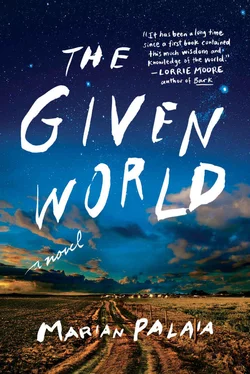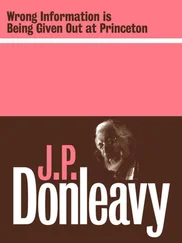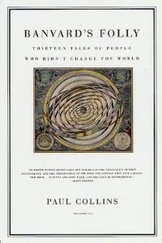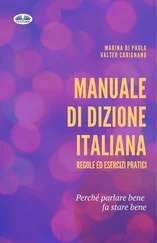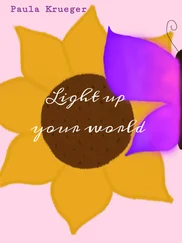“My wife makes a mean tamale,” Primo said. “Quite the production. But I don’t get to eat them anymore.”
I was digging through the cornmeal, excavating the meat inside. I asked Primo what his wife’s name was; how long she’d been gone.
“Rosa,” he said. “She’s been either going or gone on and off for years. But this time I think she really means it.” He sounded resigned, and sad.
I told him my mother’s name was Rose.
“Sweet.” He raised his beer bottle and clinked it against my soda one. “Here’s to the Roses and the Rosas,” he said. “To T.B. and T.C.”
On my birthday, Primo took me to lunch at a Cuban place on Lucky Alley. After a little bit of stuttering preamble, he offered his little back porch room for me to live in until I got on my feet, got a real job, a place of my own. “Don’t think it’s weird,” he said. “We’re compadres, officially, and besides, it’s going to get cold soon.”
I didn’t think it was weird at all but did wonder what he meant by “cold.”
“Forty or so.” He raised one eyebrow, as if that was some serious weather.
I’m sure I snorted. “That’s not cold. Forty below is cold.”
“You’ll be whistling a different tune when it comes, chica . Especially if you’re still sleeping in that car. Better take this offer while it stands. I might change my mind.” He smiled, because he didn’t mean the last part, but I said yes anyway, because what I wanted more than anything, all of a sudden, was to live in that little space, with my own door to the outside and a yard wild with red flowers.
Primo said I should find something to do, to come back in a few hours, after he’d had a chance to get my room ready. I drove thirty miles down the coast, stopping at foggy Half Moon Bay to wade in the water, which was even colder than it had been just a few weeks before. I stayed as long as I could, though, because I loved the way the sand felt, melting out from under me when the water receded. I threw stones and watched the shrieking gulls dive after them.
Silly birds.
The room was perfect. Primo had found a trundle bed somewhere, and a little blue dresser with animal and flower decals stuck to it, probably by some little kid all grown up now. Tiny white Christmas lights draped around the windows and looped from corner to corner along one wall. There were fresh flowers in a yellow vase on the windowsill. Propped on the dresser was a framed print of an angel guiding two kids across a rickety bridge over some artist’s depiction of a raging river, but the river was too narrow to be scary — like narrow enough for any decently coordinated kid to jump across. I picked up the picture and laughed. “Who’s that?”
“You don’t know her? What kind of Catholic are you?”
“A not-Catholic.”
“Right. I guess I’ll have to convert you.”
“Fat chance,” I said. “And when was the last time you went to church?”
“None of your beeswax,” he said. “That is Our Lady of Perpetual Help. She’s staying.”
“I don’t need any help,” I said. “I’ve got you. I’m good.”
He took the picture out of my hands and set it back on the dresser. “We all need help, little one. Even fairies.”
He was off the next day, so we stayed up late and watched cop shows and movies on TV. I went to bed about midnight but woke up thirsty a few hours later. I could hear sirens in the distance and remembered I had been dreaming about being in the hospital, in the ICU, after I’d flown off the roof at home. I went into the kitchen for a glass of water and could see flickering light from the TV still on in the living room, but the sound was off. I peeked around the corner to see what Primo was watching. At first I thought he was sleeping. He had his shirt off and was sitting up on the couch, but his head hung forward, and his chin was nearly resting on his chest. I saw the rest then: a piece of cloth tied around his arm, the syringe on the carpet in front of him, his hand dangling over it. A lighter. A bent-handled spoon. I must have made a noise, and Primo heard me. He lifted his head and looked. His good eye blinked a couple of times, like he was trying to clear a mist from it.
“Hey,” he said, “it’s Tinker Bell.” He reached over and untied the cloth from his arm, held it out to me like some kind of offering, looked at it like he didn’t know what it was or how it had got there, and crumpled it in his hand.
“Are you okay, Primo?”
“Yeah.” He nodded slowly and scratched his face where the scar was.
“What are you doing?” There had been a letter from Mick once, telling me about all the drugs the guys did because it made them feel better about where they were and what was going on around them. Mick smoked pot, but some — a lot, he said — were doing harder stuff. He said it was scary how tempting it was. How logical it seemed.
Primo still hadn’t answered me, and both his eyes had closed, though he was still scratching his face, the same spot, up and down.
“Primo,” I said again, kind of loud, for me. “What are you doing?”
He reopened his eyes and tried to grin, but it only took on one side of his face. “Killing the pain, sweetie. Don’t you worry. It’s all just a crazy dream.” I saw the rest of the scars, smooth and pink like Barbie-doll plastic, covering half his chest and his whole right shoulder.
I sat down on the floor. “I’m not dreaming, Primo.”
Slowly, he picked up the syringe, wrapped the cloth around it, and set it on the sofa next to him. He sighed and started to work his jaw around like it had a mechanical malfunction. He tried to say he was sorry, that he wasn’t strung out, really, but I stopped him. “I’m not a kid,” I said. “Tell it to somebody else.”
“All right, then, big girl.” He shook his head, like a person coming out of the ocean with water in his ears. He sat up straighter, but his voice was still molasses thick. “I believe you. So tell me what you’re not dreaming about.”
I bit my bottom lip hard enough to make it bleed on the inside. I was cold and I started to shiver. I had to let go of my lip so I could clench my teeth against them chattering.
“You do what you have to do, but you are not the only one—” My voice was shaking so bad it was hard to get the words out, but I kept going. “Goddamn it. I don’t care what you do out here. Just fucking come back when you’re finished. Satisfied. Fixed. Whatever.”
His head began to fall forward again, but he yanked it back up, and his eyes were still open, the good one looking at me.
“Deal,” he said. “Consider it done, Tink.”
I didn’t say good night. It wasn’t night. I stood up and went back to my room, plugged in the Christmas lights, and got into my sleeping bag. I stared at the ceiling as the lights flashed on and off against it like a conflagration of fireflies. I listened to Primo gather the remnants of his not-so-secret life, listened to him stumble around in the dark out there and stash it all away.
Frank had married young, a ballerina, but that was all over now, left in Dallas where the quarter-Mexican part of his mostly Italian heritage fit in, but not much else. He was dark and rangy, with long arms, long legs, the patience of a saint, and a heart murmur. Once the draft board classified him unfit for service, and the dancer classified him unfit for love, he developed a bad itch to be somewhere other than Texas. San Francisco drew him, along with a million other unraveled souls, but he didn’t come to San Francisco for the drugs or the easy sex, he came for the music, slinging a six-string Martin and a voice like Jerry Jeff Walker on ludes. He bypassed the Haight for a studio in the Sunset, where the streets were wide and quiet and the fog felt like a blessing after so many years of no-mercy-for-the-wicked (or the innocent) desert sun.
Читать дальше
